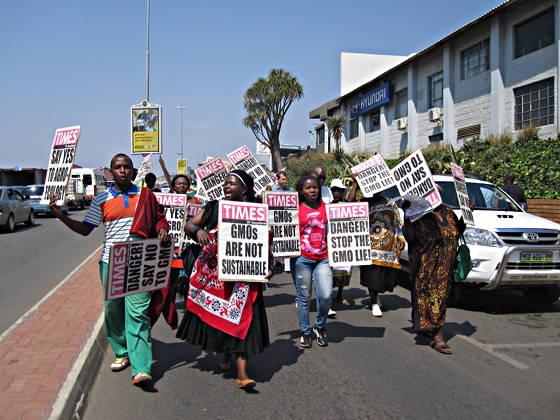Latest Resources

2 September 2020
Push back against risky and unsafe RNAi GM cassava cultivation in Kenya
An unproven genetically modified (GM) RNAi cassava variety is yet another staple food crop, after maize and banana, on the biotech industry’s agenda for commercial cultivation in Kenya. The brazen lack of safety tests contained in the Kenya Agricultural and Livestock Research Organisation’s (KARLO’s) application for cultivation, and disregard for adherence to biosafety best practise […]

25 February 2020
Insights from farmer dialogues in Kalulushi, Zambia
In 2019, the African Centre for Biodiversity (ACB) co-hosted four farmer exchanges in Zambia. The first was in Kalulushi, Copperbelt Province, in partnership with the Zambia College of Horticultural Training (ZCHT) Chapula, Kasisi Agricultural Training Centre (KATC), and the Zambia Alliance for Agroecology and Biodiversity (ZAAB). ACB Advocacy and Research Officer Rutendo Zendah gives an […]

4 March 2019
Failure of Monsanto’s drought tolerant maize pushed on Africa – confirmed in US
The ACB shares with you a blog written by ACB’s Sabrina Masinjila and Anne Maina from Biodiversity and Biosafety Association (BIBA), Kenya A recent United States Department of Agriculture (USDA) report confirms what independent biosafety scientists, and African civil society, have been stating all along: Monsanto’s drought tolerant (DT) maize (MON87460) does not work! The […]

18 October 2017
The GMO crisis in Swaziland
Swaziland is under enormous pressure to introduce genetically modified organisms (GMOs) into the country’s farming system. This pressure is coming not only from Monsanto but also from farmers and some sections of the public who have been fed a great deal of misinformation and hype by the pro-biotech machinery. The farmers, acting on incomplete and […]

31 July 2017
The Water Efficient Maize for Africa (WEMA) project: Real or false solution to climate change?
By Lim Li Ching, Senior Researcher, Third World Network Climate change is an urgent challenge facing farmers in Africa. As our world warms, many farmers are already experiencing devastating consequences, including storms, drought, floods, heat waves and extreme weather events. The implications for food security are severe, with the Intergovernmental Panel on Climate Change (IPCC) […]
